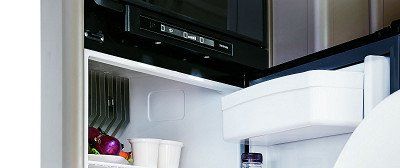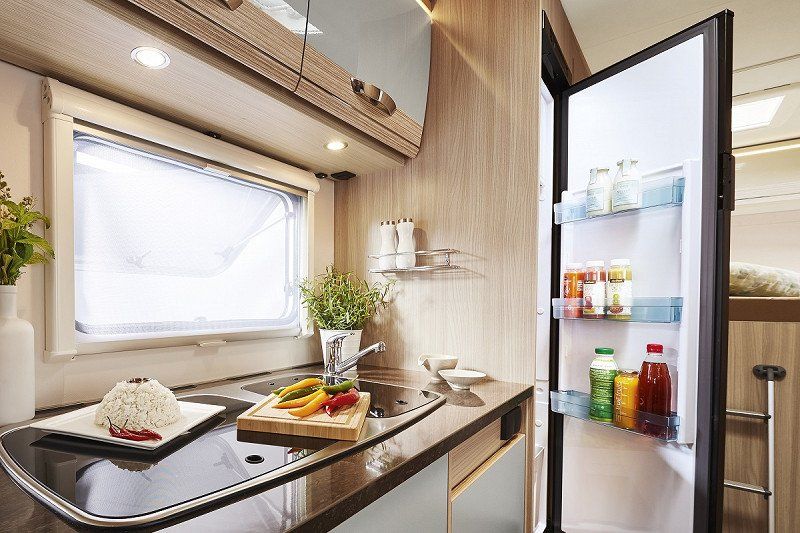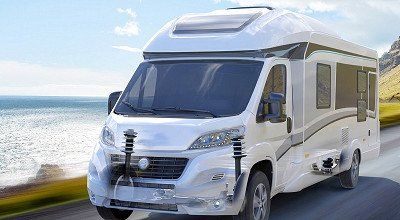When it's summer, the last thing you want is lukewarm drinks and food that spoils quickly, regardless of whether you're on a camping holiday or at home. This is why you need a refrigerator, or at least a cool box, in your caravan, motorhome or campervan that meets your personal needs. Different technologies exist, so you will have to decide which one is right for your vehicle and available energy sources. Unfortunately, there is no one refrigerator technology for motorhomes "that fits all"...
Content
The big question for your camping vehicle: an absorption or compressor refrigerator?
What is an absorption refrigerator?
Advantages and disadvantages of an absorption refrigerator in a motorhome
What is a compressor refrigerator?
Advantages and disadvantages of a compressor refrigerator in a campervan
Decision guide – how do I find the right refrigerator?
Tips & tricks for using a refrigerator in a camping vehicle

The big question for your camping vehicle: an absorption or compressor refrigerator?
When it comes to picking a refrigerator for your camping vehicle, you can basically choose between an absorption refrigerator and a compressor refrigerator or compressor cool box. The technology you subsequently decide on depends primarily on where it will be used and the capacity you require:
Absorption refrigerators are commonly fitted as standard in Motorhomes and caravans. They usually have a capacity of about 80 to 180 litres (including the freezer compartment).
Compressor refrigerators are often found in compact campervans. They usually have a volume of 10 to 80 litres, sometimes even 130 litres. Medium-sized cool boxes and smaller cool boxes that can hold upwards of four litres can be installed in urban campers or camping buses. Moreover, handy mobile coolers are available as well. Drawer-shaped compressor cool boxes are also a popular retrofit option.
Long-term or permanent campers – especially with a caravan– can also benefit from a mobile free-standing refrigerator or cool box for their awning. They are available with absorption and compressor technology, and a capacity of 40 to roughly 100 litres. However, some campsites also rent out additional refrigerators, so that you do not have to transport the extra weight with you. In this case, you will need to connect it to shore power, which can be expensive.

What is an absorption refrigerator?
An absorption refrigerator in a motorhome works on the principle of evaporative cooling. Its technical elements are a boiler, an evaporator, an absorber and a condenser, which are all interconnected in a hermetically sealed circuit. This pipe system is filled with hydrogen gas and a 30% ammonia/water solution. At first, the water containing the ammonia is heated in the boiler, which runs on electricity or gas, and is consequently separated into hot ammonia vapour and liquid ammonia.
The vapour evaporates while the liquid ammonia is sent to the evaporator inside the refrigerator. It is then converted into a gaseous ammonia/hydrogen vapour and extracts heat from the refrigerator or cools it down. The gaseous ammonia has done its job and is fed into the absorber, where it is absorbed by the water there. The water now contains ammonia again, repeating the gravity-based cycle.

Advantages and disadvantages of an absorption refrigerator in a motorhome
An absorption refrigerator needs an efficient energy source due to its technical features, especially the boiler. The great advantage of an absorption refrigerator is that it can run on 230 V shore power, 12 V battery power as well as gas in a motorhome or caravan. Modern absorption refrigerators for camping vehicles now have a temperature controller as well as an automatic switch (AES) for supplying power from 12 V to 230 V or gas, subject to availability. Motorhomes and caravans are often fitted with a manual switching system, which ultimately is also quick and easy to use. When buying a motorhome or caravan, an AES version is usually available for an additional charge or with more luxurious fittings.
Another advantage of an absorption refrigerator is its low noise level. As this technology does not have any moving parts, absorption refrigerators are practically silent. This is also the reason why this kind of refrigerator rarely breaks down, thus ensuring a long service life.
However, an absorption refrigerator also has its disadvantages. Due to the gravity principle, the refrigerator, and therefore also the motorhome or caravan, has to be as level as possible for it to work properly. Moreover, it requires more energy than a compressor refrigerator, which is especially important if the absorption refrigerator is going to be run frequently and over a longer period of time independently using a 12 V battery. However, you could compensate for it a little by adding a lithium battery. If you have a solar system on board your caravan, motorhome or campervan, then you're off the hook. But this does not change the fact that absorption refrigerators generally emit heat, therefore the cooling capacity will drop when the outside temperature is high. Not really ideal if you enjoy escaping to warmer climes in summer.
| Advantages of absorption refrigerators | Disadvantages of absorption refrigerators |
| + Silent operation (no moving parts) | – Require camper or caravan to be level |
| + Long service life (no moving parts) | - Cooling capacity drops at high outside temperatures (heat emission ) |
| + Independence for several days (full gas bottles & on-board battery) | - High energy output (on-board battery) |
What is a compressor refrigerator?
A compressor refrigerator also works on the principle of evaporative cooling. However, its technical components are similar to those of a domestic refrigerator. A compressor, an evaporator and a condenser come together in the form of cooling coils on the back in a closed pipe system, in which a refrigerant circulates that has been extracted from the evaporator inside the refrigerator by an electrically driven compressor.
The resulting relationship between the low pressure inside and high pressure outside converts the refrigerant into a gas. This evaporation process extracts the heat out of the fridge or cools the fridge down. The compressor then pushes the refrigerant further into the condenser while releasing the extracted heat into the environment through fins. And the cycle begins again.
Advantages and disadvantages of a compressor refrigerator in a campervan
Compressor refrigerators are known for their low energy consumption. You could say that they only need half the electricity of absorption refrigerators. However, herein lies a disadvantage as the compressor in this kind of refrigerator or cool box can only run on electricity – either 230 V from the socket or a 12 V battery. Not a problem for campers who normally use shore power on campsites or pitches anyway. However, if you tend to travel a lot and are self-sufficient, we recommend installing a solar system in your mobile home or campervan as compressor refrigerators cannot run on gas.
Another advantage is that compressor refrigerators also work when they are not in the right position, i.e. the campervan or camping bus does not have to be parked on a level surface. And anyone who likes spending their summer camping holiday where it's warm will also be glad to hear that the cooling capacity of a compressor refrigerator is not affected by the outside temperature and remains stable even in extreme heat.

Similar to a domestic refrigerator, a compressor refrigerator in a mobile home or campervan does create some noise. This can be annoying in a small space, e.g. on a hot summer's night and the bed is right next to the kitchen area. Moreover, its design brings another disadvantage: as it has moving parts, the probability that something will break and need to be repaired is quite high. Therefore, the service life of compressor refrigerators is often rated lower than that of absorption refrigerators.
| Advantages of compressor refrigerators | Disadvantages of compressor refrigerators |
| + The motorhome or campervan can also be parked on a slope | – Noise during operation |
| + The cooling capacity is not affected by the outside temperature | – Shorter service life (moving parts) |
| + Comparatively low power requirement | – Cannot run on gas, electricity is a must |
Incidentally, the advantage of a cool box compared to a refrigerator is that the cold air does not escape when you open it. However, it is slightly more difficult to access the refrigerated food. Obviously a cool box does not have the volume of a larger refrigerator. But anyone thinking of fitting a small refrigerator in their camping bus might also consider a cool box as an alternative.

Decision guide – how do I find the right refrigerator?
When choosing the refrigerator technology for your motorhome, caravan or campervan, you first need to ask yourself two questions:- Which energy source will you mainly be using or is available in your camping vehicle?
a) Predominant use of shore power at campsites or pitches:
absorption refrigerator or compressor refrigerator/cool box
b) Gas in order to be independent of shore power:
absorption refrigerator
c) Permanent 12 V operation in order to be independent of shore power:
compressor refrigerator or cool box
d) Predominantly powered by solar panels:
absorption refrigerator or compressor refrigerator (preferably a compressor refrigerator because of the lower power requirement) - How hot will it be when you travel to your favourite countries?
a) Normally not above 30 °C:
absorption refrigerator or compressor refrigerator/cool box
b) Frequently, and for longer periods, above 30 °C:
compressor refrigerator/cool box
Tips & tricks for using a refrigerator in a camping vehicle
- Turn on the refrigerator a day or two before your trip – this ensures it will be cold enough to store food.
- Pre-cool your groceries in your refrigerator at home if possible. A refrigerator requires more energy if a lot of warm food is put into it. Since water stores the cold better than air, food that has already been chilled can function like a cold pack. Therefore, it stays cold for longer in a full fridge without using extra energy.
- Be sure to switch the fridge to 12 V operation before you set off. It is forbidden to use gas while driving.
- Hardly anyone wants to park their camper in the blazing summer sun. However, if this cannot be avoided, make sure that the side of the vehicle where the refrigerator is located is not in the sun. If it is directly in the sun the heat might reduce the cooling capacity.
- Clean the outer ventilation grilles regularly – dirt can also reduce the cooling capacity.






